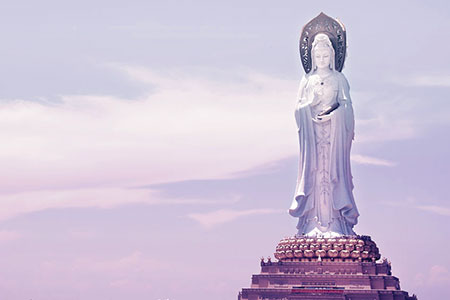spiritual teachings
Can A Christian Be Psychic?
 I am often asked if I personally have a problem being a professional psychic, as well as a Christian. Some people seem to feel that working as a psychic is against the teachings of the Bible.
I am often asked if I personally have a problem being a professional psychic, as well as a Christian. Some people seem to feel that working as a psychic is against the teachings of the Bible.
Growing up in a Christian, church-going family I was never taught that being a psychic was something considered as being wrong in the Bible.
Not only were we brought up in the Christian faith, but I also come from a long line of psychics in my family. Being both psychic and Christian is something that was never considered strange in my family; to us it was normal.
The Bible has accounts of many great prophets that did amazing things. Not only did some of them contribute to the actual writing of the Bible, but they were also a part of many miracles and wonders. They made a difference in the outcome of important Biblical events. They were the messengers of God.
The calling of a psychic is very similar to the work of a prophet. I guess it is just on a smaller scale? When a psychic does a reading they see many things from the past, the present and the future, the same way the prophets did in the Bible. The prophets were there to help, guide, advise and warn of coming danger, the same way modern psychics read for their clients.
Being born a psychic or medium is a God-given talent and calling. Did you know that one of the world’s most well-known psychics, Edgar Cayce, was also a devout Christian who read through the whole Bible once every year. Why should a psychic, who received his gifts from God, be persecuted as someone who is doing evil?
When Relationships Are Not Meant To Be
 I have in recent months become particularly aware how many people are increasingly reminiscing about failed past relationships. In some cases, these are relationships that go back many years. Some folks even go as far as stalking their ex-partners on social media!
I have in recent months become particularly aware how many people are increasingly reminiscing about failed past relationships. In some cases, these are relationships that go back many years. Some folks even go as far as stalking their ex-partners on social media!
I believe it is mainly due to the unusual circumstances caused by the pandemic over the past two years, which prevented the possibility of meeting a new people, or going out on dates. It also brought many of us intense life lessons regarding love, connection, belonging, and loneliness.
I see these issues coming up in many readings nowadays and it often doesn´t sit too well with some of my clients, who tend to feel that their ‘love luck is down,’ or that that the universe is somehow ‘punishing’ them. In extreme cases, folks even believe a hex or curse may have been placed on them.
I also find many people are talking about ´what ifs.’ If only they had done things differently, how things might have turned out differently. But perhaps, if things were meant to have worked out differently, it would have? Again, this would fall in line with certain life lessons we came to this world to experience. I believe we have chosen to incarnate into this world at a time when romantic and social relationships often tend to be more fleeting and distant, especially because of digital technology and our rushed modern way of living.
Interestingly, I am also seeing lately more divorcées remarrying their former spouse after spending many years apart, and despite having lived a new life with someone else in the interim. This often drives their children insane after all the heartbreak, drama and grief the divorce had unnecessarily caused the family. Again, a hard lesson, but a life lesson nevertheless for all concerned.
Reclaim Your Dreams In 2022
 As we welcome 2022 today, let us cast off the heavy cloud of doubt and hopelessness of recent times and rise to reclaim a life of peace, health and happiness.
As we welcome 2022 today, let us cast off the heavy cloud of doubt and hopelessness of recent times and rise to reclaim a life of peace, health and happiness.
No matter where you are in the world, we have each experienced much uncertainty and trauma over the last two years. The global biological crisis that continues to plague public health everywhere has proven to be difficult and even devastating for all of us in various ways. For some oof us there has been intense loss, sorrow, and grief. Some of us have merely felt stuck or trapped, others emotionally drained and world-weary.
Some of us have utilized this period of uncertainty to forge a stronger relationship with Spirit and have found a more meaningful, mindful approach to life. My personal circumstances led me to embrace gratitude at every level of my life. I have become deeply thankful for everything in my life.
Metaphysically this challenging period in world history is symbolic of the great change that each of us is called to make in our lifetime. In believe the fact that our glorious planet has become environmentally polluted and desecrated by humanity set the tone for the present pandemic to emerge. Our species now reflects the state of planet upon which we exist. Indeed, both our species and the place we collectively call home are now in dire need of healing.
Many spiritual traditions teach that each of us has the innate power to transform our world through our dynamic personal energy that springs forth from a greater universal presence that is known to many by different names. For some this profound source of energy may manifest as an increase in purposeful prayer or meditation. For others this stream is a continuous movement of spiritual light that transmits to every corner of the world, a bold gleaming light that knows no boundaries.
The Spiritual Calling Of Animal Rescue
 I have always felt that I have two life callings: my work and taking care of rescue animals. And I aim to do both to the best of my ability.
I have always felt that I have two life callings: my work and taking care of rescue animals. And I aim to do both to the best of my ability.
A neighbor stopped me today as I was walking my dogs. This often happens when I am out with them. He asked me why I chose to walk the dogs, while I have a large plot of land for them to freely roam.
Well, they do run around on the property, at least the two younger ones do, but the pleasure of walking them is immeasurable. It is a true joy to see them relishing in the unfamiliar smells and the intriguing creatures they encounter in the countryside. They even made friends with a nearby farm’s goats and another neighbor’s cat.
I also enjoy the lovely countryside around me, which I will be less likely to experience on my own had it not been for the reminding me every day that it is time to go ‘walkies.’ Apart from the obvious exercise being advantageous for my health and well-being, it is also a sort of a meditative process and spiritual practice, because I am required to be very present in the moment.
One of my dogs is a warren hound, known in Spanish as a podenco. They are a Mediterranean rabbit-hunting dog breed. So, she’s a hunting dog and if she suddenly makes a dash to chase something, she could easily catch me off guard and pull me over. I can therefore no afford to be distracted or preoccupied. Instead, I must mindful and aware, which is very beneficial for my inner peace and spiritual alignment.
My dogs and cats are all rescues, some from unthinkably harsh backgrounds. Looking after them has involved a lot of care and veterinary visits, including many specialist observations and surgeries. When you take rescues into your home, they tend to come with much fear and many insecurities, which takes patience and unconditional love.
Two large rescue dogs, that have since departed this life to cross over the rainbow-bridge, wouldn’t allow me to touch them and refused to come inside the house. I provided them adequate shelter outside, but it still bothered me, because the winters can be harsh here in Spain.
Life Invites You To Dance
 In the quietude of the morning, as the sun gently rises with a golden glow glistening through the trees, I feel a calm within reflecting the clear blue sky. The season is changing. The heavy heat and humidity of summer has dissolved into an idyllic balance of coolness, warmth, and lightness in the air.
In the quietude of the morning, as the sun gently rises with a golden glow glistening through the trees, I feel a calm within reflecting the clear blue sky. The season is changing. The heavy heat and humidity of summer has dissolved into an idyllic balance of coolness, warmth, and lightness in the air.
It is a time of transition, moving toward autumn, but not fully there yet. For me, it is a season of revitalization and renewed inspiration. The vastness of nature expands all around and the interconnectedness of every soul within it reaches the forefront of my awareness.
Today, I will be intuitively teaching a dancing with nature class at the World Peace Sanctuary nearby. All of life is a dance with nature and its Creator. We are invited into that partnership and party of life, to move together in joy and harmony.
But how do we join the flow? It begins at the feet, at the root of the tree of life. In Srimad-Bhagavatam, the great celestial sage Narada instructs, “As pouring water on the root of a tree energizes the trunk, branches, twigs and everything else, and as supplying food to the stomach enlivens the senses and limbs of the body, simply worshiping the Supreme Personality of Godhead through devotional service automatically satisfies the demigods, who are parts of that Supreme Personality.”
Not only are angels, nature spirits, and demigods part of the tree, but so are we. Like leaves upon it, we are connected not only with the twigs, branches, and trunk, but with the root, the very source and sustenance of all life. By watering that root with our whole-hearted attention and intention, we are nourished, supplied, and satisfied.
But what does this mean practically? It means peace and growth rest not in pursuit of individual desires, but in harmony with and service to Divine desires. Endeavoring to serve separate interests is futile and unfulfilling, just as watering the leaves and limbs of a tree individually would be. They would dry up and die if simply watered separately. Continue reading

